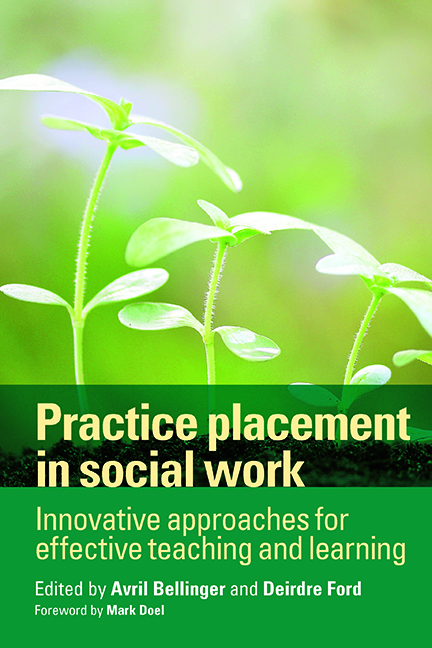Book contents
- Frontmatter
- Dedication
- Contents
- Foreword
- Notes on contributors
- Introduction
- One Student-led services
- Two International placements: learning from a distance
- Three The outside looking in – an independent social worker’s experience of practice educator work
- Four ‘Do you have to be white to pass this course?’ Developing support for black and minority ethnic students in a predominantly white area
- Five Men in social work education: building a gendered alliance
- Six Hidden in plain sight: use of an arts-based method for critical reflection
- Seven Getting our hands dirty: reconnecting social work education as if the earth matters
- Eight Social media for students in practice
- Nine Developing placement capacity in the third sector
- Ten Observations of student practice: what difference does observer qualification make?
- Eleven Filling the gap: constructive responses to the erosion of training standards for practice educators
- Twelve The concept of integrity in relation to failing and marginal students
- Thirteen Cultivating discretion: social work education in practice and the academy
- Index
Seven - Getting our hands dirty: reconnecting social work education as if the earth matters
Published online by Cambridge University Press: 01 September 2022
- Frontmatter
- Dedication
- Contents
- Foreword
- Notes on contributors
- Introduction
- One Student-led services
- Two International placements: learning from a distance
- Three The outside looking in – an independent social worker’s experience of practice educator work
- Four ‘Do you have to be white to pass this course?’ Developing support for black and minority ethnic students in a predominantly white area
- Five Men in social work education: building a gendered alliance
- Six Hidden in plain sight: use of an arts-based method for critical reflection
- Seven Getting our hands dirty: reconnecting social work education as if the earth matters
- Eight Social media for students in practice
- Nine Developing placement capacity in the third sector
- Ten Observations of student practice: what difference does observer qualification make?
- Eleven Filling the gap: constructive responses to the erosion of training standards for practice educators
- Twelve The concept of integrity in relation to failing and marginal students
- Thirteen Cultivating discretion: social work education in practice and the academy
- Index
Summary
Introduction
I am a practice educator currently working in an undergraduate social work programme at Plymouth University. I have responsibility for developing and supporting practice learning arrangements and for working with students, both in placement and in the classroom, to facilitate their learning and professional development.
For the last seven years, I have been actively developing placements where students are directly involved in, and contributing to, a range of projects aiming to:
• improve and create access for people to natural green space;
• engage people more closely with food production;
• provide reparation or training opportunities benefitting the natural environment; and
• offer therapeutic benefit through horticultural or recreational activity.
My efforts have been located within first-year individual and group placements. My aims are to:
• reveal the benefits of closer alliance with the natural environment;
• advance an appreciation in students of the interdependence between social and environmental justice;
• develop awareness of how environmental conditions affect well-being; and
• identify approaches that they may apply to their practice.
In this chapter, I will explore the work that I have undertaken regarding sustainability and social work. It will reflect my own personal, transformational experiences and how my practice as a social work educator has developed more broadly as a result. I will first locate my work in wider global and vocational contexts and discuss some of the strategies that I have developed in response to the challenges and opportunities that the work has presented. I will also consider the impact that my work has had on student learning, as well as my own, with a view to establishing future directions in advancing environmental social work.
The inspiration for the initiatives described in this chapter came from my attendance at Schumacher College's ‘Roots of Learning’ course in early 2007, supported and funded by the Centre for Sustainable Futures (a Centre of Excellence for Teaching and Learning financed by the Higher Education Funding Council for England to promote Education for Sustainable Development) based at Plymouth University (see Schumacher College, no date). Subtitled ‘Education as a Springboard for Transformation’, the course was specifically designed for teachers and academics who were interested in introducing sustainability into schools and higher education.
- Type
- Chapter
- Information
- Practice Placement in Social WorkInnovative Approaches for Effective Teaching and Learning, pp. 103 - 120Publisher: Bristol University PressPrint publication year: 2016

